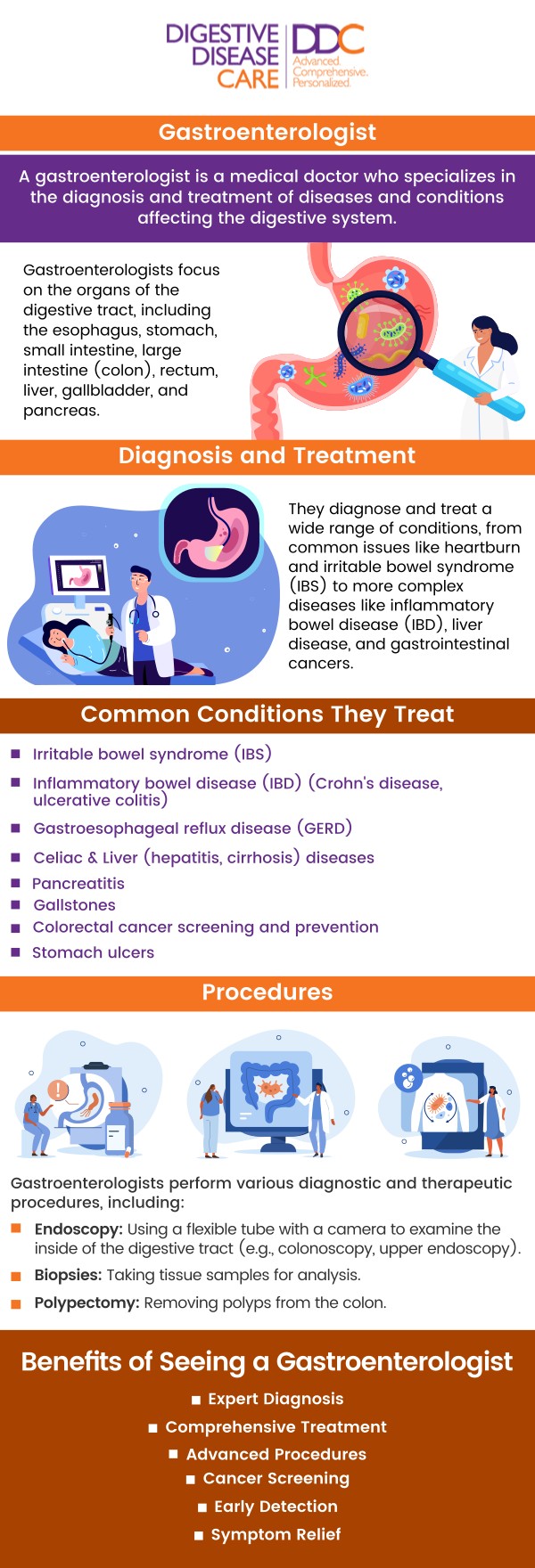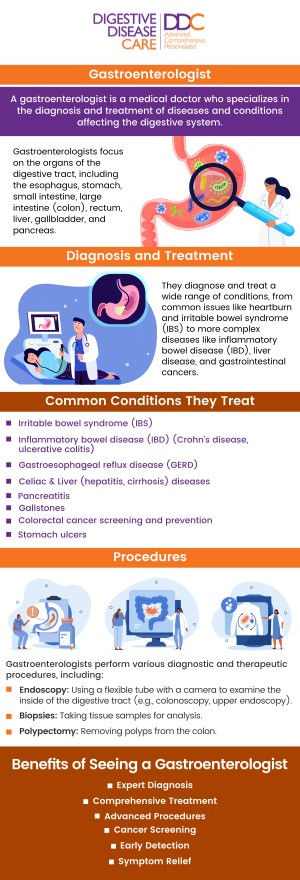When to See a Gastroenterologist Q&A
If you’re experiencing persistent digestive issues such as chronic heartburn, unexplained weight loss, or severe abdominal pain, it may be time to see a gastroenterologist. At Digestive Disease Care. Our board-certified gastroenterologists specialize in diagnosing and treating a wide range of gastrointestinal conditions, from irritable bowel syndrome (IBS) to inflammatory bowel disease (IBD). For more information, please contact us or request an appointment online. We have convenient locations to serve you in Babylon NY, East Setauket NY, Forest Hills NY, Jericho NY, Lake Success NY, Melville NY, Mineola NY, Massapequa NY, New Hyde Park NY and Riverhead NY.


Table of Contents:
When should I see a gastroenterologist?
How does a gastroenterologist diagnose gastrointestinal issues?
What symptoms indicate I should see a gastroenterologist?
What tests should I expect if I see a gastroenterologist for my symptoms?
Understanding when to consult a gastroenterologist at Digestive Disease Care can be crucial for maintaining your digestive health. Our team of specialized gastroenterologists is dedicated to diagnosing and treating conditions related to the gastrointestinal tract, liver, pancreas, and gallbladder.
If you experience persistent or severe gastrointestinal symptoms, it’s important to consult a gastroenterologist. Symptoms such as ongoing abdominal pain, frequent heartburn, or significant changes in bowel habits like diarrhea or constipation should not be ignored. A specialist can provide a thorough evaluation and recommend appropriate treatment.
Other signs that may indicate the need for a gastroenterologist include blood in the stool, unexplained weight loss, persistent nausea, difficulty swallowing, or jaundice (yellowing of the skin and eyes). If over-the-counter medications haven’t helped, or if you have a family history of gastrointestinal issues, it’s beneficial to seek professional care. Regular checkups are also recommended for those with chronic digestive conditions to ensure effective management and early detection of any complications.
While occasional digestive discomfort is common, persistent, severe, or unusual symptoms are a signal to seek the expertise of a gastroenterologist to ensure appropriate diagnosis and treatment. Our commitment is to provide compassionate care and advanced medical solutions to support your digestive health.
A gastroenterologist diagnoses gastrointestinal issues by first conducting a detailed consultation with the patient to understand the nature, duration, and severity of their symptoms. They also review any family history of gastrointestinal disorders to identify potential risk factors and provide context for further investigation. This personalized approach ensures the diagnosis is tailored to the patient’s specific concerns.
After the consultation, a physical examination is performed, where the gastroenterologist may palpate the abdomen to check for tenderness, swelling, or abnormal masses, which could indicate areas requiring further testing. A range of diagnostic tests is then used, including blood, stool, and breath tests, to detect inflammation, infection, or malabsorption. Blood tests can reveal anemia or infection, while stool tests identify blood, pathogens, or signs of malabsorption. Breath tests are useful in diagnosing conditions like lactose intolerance or small intestinal bacterial overgrowth.
Advanced imaging techniques provide detailed visual assessments of the digestive tract, helping to identify structural abnormalities, blockages, or inflammation. Endoscopic procedures like upper endoscopies and colonoscopies allow direct visualization of the gastrointestinal tract, with the ability to obtain biopsy samples for further analysis. These procedures help diagnose conditions such as celiac disease, inflammatory bowel disease, or cancer. In some cases, specialized tests like capsule endoscopy or motility studies may be recommended for a more comprehensive evaluation of the digestive system.
Our skilled team of gastroenterologists employs a patient-centered approach to diagnose and manage a wide array of gastrointestinal conditions. We prioritize a thorough understanding of each patient’s unique medical history and symptoms to guide our diagnostic process effectively.
If you’re experiencing certain symptoms, it may be time to consult a gastroenterologist for further evaluation. Persistent abdominal pain, especially if it’s severe or impacts your daily activities, should not be ignored. Similarly, ongoing heartburn or acid reflux that doesn’t improve with over-the-counter medications may require a closer look from a specialist.
Changes in bowel habits, such as prolonged diarrhea, constipation, or blood in the stool, can signal underlying gastrointestinal issues. Unexplained weight loss or a noticeable decrease in appetite are also signs that should be addressed with a gastroenterologist. Symptoms like difficulty swallowing or persistent nausea and vomiting can also warrant professional attention. Jaundice, which causes yellowing of the skin and eyes, may indicate liver problems and should be evaluated promptly.
Additionally, if you have a family history of gastrointestinal diseases, such as colorectal cancer or inflammatory bowel disease, or if you have risk factors like long-term medications use or smoking, it’s important to seek expert advice, even if symptoms are mild. Early detection and intervention can be crucial in effectively managing potential gastrointestinal disorders. Our dedicated professionals are here to provide comprehensive care and support for all your digestive health needs.
At Digestive Disease Care, we prioritize a thorough and personalized approach to diagnosing and managing your gastrointestinal health. When you visit our practice for a consultation, you can expect an evaluation designed to uncover the root cause of your symptoms and tailor a treatment plan specific to your needs.
If you visit a gastroenterologist for your symptoms, you can expect a thorough evaluation process aimed at understanding the underlying cause of your condition. The appointment typically begins with a detailed review of your medical history, including your symptoms, diet, and family history, to help guide the examination.
Your gastroenterologist will conduct a physical examination, which may involve palpating your abdomen to identify any tenderness or irregularities. Laboratory tests are often performed to assess conditions like anemia, inflammation, infections, or issues with liver and pancreatic function. Stool tests are also common to check for infections, bleeding, or malabsorption issues.
To get a clearer view of your internal organs, imaging studies may be recommended. These techniques help identify structural abnormalities, blockages, or other potential issues in your digestive system. Additionally, endoscopic procedures like an upper endoscopy or colonoscopy may be necessary to visually examine your digestive tract for signs of inflammation, ulcers, polyps, or tumors. Specialized tests may also be used depending on your symptoms to evaluate digestive function and conditions like GERD.
At Digestive Disease Care, each diagnostic step is meticulously designed to provide valuable insights into your gastrointestinal health. Contact us or book your appointment and start your journey to optimal digestive health. We have convenient locations to serve you in Melville NY, New Hyde Park NY, Forest Hills NY, Jericho NY, Mineola NY, Lake Success NY, Babylon NY, East Setauket NY, Massapequa NY, Riverhead NY and BEYOND.

Check Out Our 5 Star Reviews


Additional Services You May Like

Additional Services You May Like
- Abdominal Pain
- Acid Reflux
- Barretts Esophagus
- Bloating
- Capsule Endoscopy
- Celiac Disease
- Colon Cancer Screening
- Colonoscopy
- Constipation
- Crohns Disease
- Diarrhea
- Diverticulitis
- Esophageal PH Monitoring
- Fatty Liver
- Fibroscan
- Gallstones
- Gastroenterologist
- Gastric Chest Pain
- Gluten Intolerance
- Hemorrhoid
- Hemorrhoid Banding
- Hepatitis
- Irritable Bowel Syndrome
- Lactose Intolerance
- Pancreatitis
- Polyps
- Rectal Bleeding
- Stomach
- Ulcerative Colitis
- GI Urgent Care





